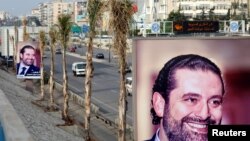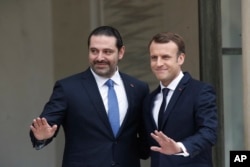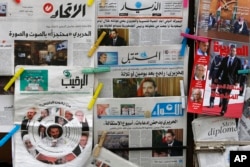Saad al-Hariri, who announced his resignation as Lebanon's prime minister earlier this month, plans to visit Egypt Tuesday before returning home.
His office announced Sunday he will meet with Egyptian President Abdel Fattah el-Sissi in Cairo.
A day later Hariri plans to return to Beirut and explain the surprising resignation announcement he made November 4 while in Saudi Arabia. In that appearance on Saudi TV, Hariri blamed Iran and Hezbollah, which is part of the Lebanese government, for the move, saying he feared for his life.
Hariri spoke Saturday at the Elysee presidential palace in Paris with French President Emmanuel Macron, who offered to help Hariri resolve his role in the bizarre Lebanese political drama.
"As you know I have resigned and we will speak about this matter there [Lebanon]," Hariri said, adding he would take part in the country's independence day celebrations on Wednesday.
"With regard to the political situation in Lebanon ... I will make known my position on these subjects after meeting President [Michel] Aoun," he said.
On Nov. 4, Hariri resigned from office on Saudi TV, sparking turmoil and skepticism. He blamed Iran and Hezbollah, which is part of the Lebanese government, for the move, saying he feared for his life.
On Sunday, as foreign ministers from Saudi Arabia and other Arab countries met in Cairo to discuss confronting Iran, Lebanese Foreign Minister Gebran Bassil stayed home.
Riyadh called for the Arab League meeting after it said Saudi air defenses intercepted a missile that was fired from Yemen November 4. Riyadh accused Iran-backed rebels fighting in Yemen of launching the rocket.
The White House issued a statement Saturday saying President Donald Trump had spoken with Macron about the situation in Lebanon and Syria and both presidents "agreed on the need to work with allies to counter Hezbollah's and Iran's destabilizing activities in the region."
'Behind the scenes'
The French president previously dismissed speculation he offered Hariri exile. But some are not so sure.
“I think it’s hugely uncertain now about what is happening behind the scenes,” said Julien Barnes-Dacey, Middle East analyst at the European Council on Foreign Relations. “What [Hariri’s] plans are after this, and the nature of this deal is hugely questionable.”
Hariri’s announcement has highlighted the deep political fractures in Lebanon, torn between the competing influences of Shi’ite Tehran and Sunni Riyadh, and unleashed accusations the Saudis were detaining Hariri against his will.
“Lebanon will have to overcome this big obstacle,” Lebanese Interior Minister Nohad Machnouk said on Friday of Hariri’s departure for Paris, predicting a “door will open to more stability.”
Hariri’s visit clearly marks a diplomatic coup for 39-year-old French President Macron and his broader bid to reassert France on the world stage. That includes the Middle East, where Macron paid a surprise visit to Saudi Arabia last week at the height of the Hariri crisis, after inaugurating the new Louvre museum in Abu Dhabi.
The opening was seen by some observers as a manifestation of French “soft power” in the region.
“It’s certainly an achievement for Macron,” Barnes-Dacey said of Hariri’s impending visit to France, which he noted also reflected a “backtracking” by Saudi Arabia in letting the Lebanese leader go.
If the move helps to stabilize the crisis, he added, “I think that will be seen as a very successful French initiative.”
Some skepticism
Others are skeptical about the potential payback.
“It’s a nice diplomatic coup for France,” Middle East analyst Karim Emile Bitar told French radio, describing France’s invitation as face-saving for both Riyadh and Hariri. But, he added, “it doesn't solve much.”
If Hariri does indeed go into exile, it would not be a first for Lebanese officials.
Hariri spent three years residing in France and Saudi Arabia after the national unity government he then headed collapsed in 2011.
France was also home to Lebanese President Michel Aoun during his own 15-year exile that ended in 2005.
Beyond tapping historic French ties and influence in Lebanon, Macron is reaping the success of a more rebalanced French policy in the Middle East, some analysts say.
Even as his administration reaffirms its relations with powerful Sunni countries like Saudi Arabia and Egypt -- Macron met with Saudi Crown Prince Mohammed Bin Salman last week and Egypt's President Abdel Fattah el-Sissi last month. Macron is also mulling a visit next year to Tehran, where French businesses are scrambling to invest.






